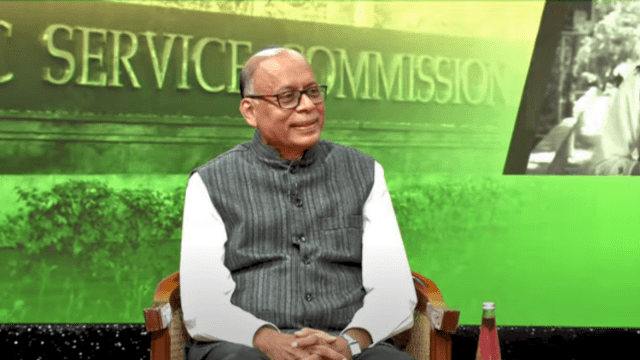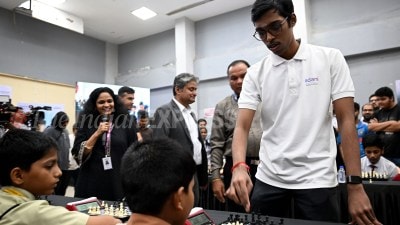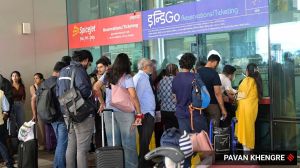Does the CSAT favour candidates with engineering backgrounds? UPSC Chairman answers
UPSC chairperson Dr Ajay Kumar hosts live Q&A, answering key questions on eligibility, CSAT, reforms, age limits, stigma, Pratibha Setu, and anti‑cheating measures for aspirants.
 UPSC chairperson during the interaction (Screengrab from live telecast)
UPSC chairperson during the interaction (Screengrab from live telecast)In a first, the Union Public Service Commission (UPSC) chairperson, Dr Ajay Kumar, held a live interaction session with civil services aspirants on October 1, marking the beginning of the country’s premier recruitment body – UPSC’s centenary year. In the open interaction, Dr Kumar addressed long-standing questions related to eligibility, CSAT, evaluation, reforms, and fairness in the examination system. Below are the highlights of the conversation.
Q: Recently, there have been concerns about aspirants cheating through false certificates or manipulation. How does UPSC deal with such cases?
UPSC follows a strict zero-tolerance policy. Anyone found cheating—whether by using fake documents, manipulating age, or engaging in exam malpractice—faces the strictest action under rules and laws. Such candidates are barred from appearing in UPSC exams for at least three years. In cases of criminal fraud, FIRs are filed and legal proceedings follow. Technology is being increasingly used to detect such misconduct, and aspirants are strongly advised not to attempt such shortcuts.
Q: Why does UPSC not share answer keys and OMR sheets immediately after prelims, like some state exams do?
After prelims, we invite candidate inputs through an online portal. Thousands of suggestions are reviewed by top academic experts who are independent and anonymous. If discrepancies are found, answers are revised. Final keys are released before the next exam cycle. Regarding OMR sheets, candidates can obtain them, and question papers are already available. The matter of immediate disclosure is currently sub-judice in the Hon’ble Supreme Court, and UPSC will follow the final judgment.
Q: There are repeated questions about the cut-off date for eligibility. Why is August 1 kept as the cut-off instead of January 1?
The system is consistent: exams held in the first half of the year have January 1 as the cut-off, and those in the second half follow August 1. This has been the practice since the 1960s-70s. If we shift to January 1, many graduates who finish in May-June will lose nearly a year of eligibility. August 1 ensures they don’t face that gap. It’s uniform, notified in advance, and followed consistently. State PSCs may follow their own rules, but UPSC’s dates are independent and long-established.
Q: Many aspirants feel the CSAT (Paper II in prelims) favors candidates with engineering or quantitative backgrounds. Is this true?
CSAT is only a qualifying paper requiring 33% marks; it does not count towards merit. The paper has three balanced sections: language, quantitative ability, and logical reasoning. Each candidate has an opportunity to clear it based on their strengths. The idea is to ensure future civil servants possess basic comprehension, logic, and problem-solving skills essential for governance.
Q: What is the relevance of optional subjects in mains? Will UPSC consider removing them in the future?
In mains, along with four GS papers, an essay, and the interview, candidates appear for two optional subject papers. The optional accounts for 2/7th of the total written score. The idea is to test a candidate’s depth of knowledge in a subject of their choice, which reflects their ability to grasp and apply complex ideas. This flexibility helps in assessing merit and prepares candidates to adapt to new subjects during their career. As of now, optionals remain an integral part of the examination.
Q: Aspirants often complain that prelims results take almost a year, leaving little scope for improvement. Can UPSC release cut-offs earlier?
The current system already allows aspirants to submit inputs through the QREP portal. Before the next exam cycle, candidates receive final answers and cut-offs, which help in preparation. However, the issue of releasing earlier cut-offs is part of a Supreme Court case. The Commission will implement the court’s decision.
Q: There are ongoing rumours about reducing the upper age limit and number of attempts. Is UPSC planning such changes?
Currently, the upper age is 32 years for general category (9 attempts for OBC, 37 years with unlimited attempts for SC/ST, and additional 10 years relaxation for PwD candidates). These relaxations were revised in 2014. There is no proposal to reduce age limits or attempts. While individual views differ—some ask for relaxation, some for reduction—the present framework is balanced and stable. Aspirants should not believe in rumours.
Q: Is there a bias in favour of urban candidates who have better access to coaching, compared to rural aspirants?
UPSC ensures complete neutrality—answer sheets do not reveal a candidate’s identity or background. Data shows that 80-90% of successful candidates today come from tier-2, tier-3 cities, and rural areas. As for coaching, it is not mandatory. Many aspirants succeed through self-study. The larger issue of dependence on coaching exists across competitive exams like JEE and NEET, and the National Education Policy aims to address systemic gaps. But UPSC has seen many success stories without coaching.
Q: Can aspirants expect reforms in UPSC examinations in the near future?
UPSC evolves with time. Since today’s aspirants are a digital generation, we are adopting new technologies. Aadhaar integration and face authentication have been introduced to prevent impersonation. A new portal has been launched to streamline processes. Going forward, reforms will continue to ensure inclusivity, fairness, and transparency while keeping pace with digital advancements.
Q: What is the Pratibha Setu portal, and how does it benefit candidates who narrowly miss the UPSC merit list?
The Pratibha Setu portal was launched to create opportunities for candidates who clear UPSC stages but miss the final list by a small margin. With candidates’ consent, their details are shared with public and private organisations seeking such talented individuals. Many aspirants have already received job offers through this initiative, making it a new and successful pathway for candidates outside the civil services list.
Q: Many aspirants complain that UPSC’s grievance redressal and helpdesk system is ineffective. Are there any improvements planned?
This concern has come to our notice. Earlier, the helpdesk was active only during the application and exam periods. We have now decided to keep it open throughout the year, so candidates can seek support at any time. Additionally, UPSC has launched its official LinkedIn portal for direct communication. These measures are part of ongoing efforts to make the Commission more accessible and responsive.
Q: Sir, on a personal note, could you share your own UPSC journey and the key reasons for your success?
Like many aspirants today, I too once prepared for UPSC while pursuing my BTech from IIT Kanpur. At that time, going abroad for higher studies was common, but I chose to stay in India and serve here. I cleared both the IAS and Engineering Services exams. Competition was less intense then, but what helped me most were certain principles: staying curious, maintaining consistency in daily study, focusing fully on my goal, keeping a positive mindset even in failure, and managing time effectively. These lessons, I believe, are useful for all aspirants even today.
Q: How does UPSC ensure fairness in mains evaluation and interviews, especially across different subjects and boards?
Evaluation is carried out by top subject experts who remain anonymous. For every subject, model keys are prepared and multiple levels of review ensure uniformity. Beyond that, a moderation process is applied—a statistically proven and Supreme Court–approved method—to balance marks across subjects and bring all candidates onto a common merit list. This ensures fairness despite the diversity of disciplines.
Q: Sometimes prelims questions are dropped. Why does this happen and how is fairness ensured?
Paper-setting is a rigorous multi-level process involving experts, but knowledge evolves and sometimes questions may allow multiple valid interpretations. In rare cases, such questions are dropped to maintain fairness. For example, if one question out of 100 is removed, the paper is evaluated out of 99, ensuring that no candidate is disadvantaged.
Q: If you were preparing for UPSC again today, what strategies would you adopt?
I firmly believe self-study is the best form of preparation. Coaching is not necessary. Preparation involves long hours, self-doubt, and moments of failure, but the key is perseverance, discipline, and self-belief. Think of it like running: you may feel tired, but you must push yourself one step further each day. Consistency, curiosity, focus, and time management are crucial.
Q: Does a candidate’s background — such as rural or urban, engineering or humanities — affect interview performance or final selection?
Absolutely not. Answer scripts are anonymous, and interviews are conducted by senior, experienced advisors who evaluate only merit. Data shows no significant difference in marks based on background. Interestingly, many engineers actually qualify with humanities optionals. UPSC treats every candidate equally.
Q: Will such direct town hall interactions with aspirants be held regularly?
Yes, this initiative will continue from time to time. The purpose is to build trust and communication with aspirants, making the examination process more transparent and accessible.
Q: What is your advice for aspirants who miss selection by a narrow margin?
Firstly, the Pratibha Setu portal provides new opportunities, often with excellent starting salaries and roles. Secondly, civil services is not the only pathway. The hard work and discipline developed during UPSC preparation equips aspirants to excel in any field. Candidates should see themselves as winners regardless of the outcome.
Q: Coaching dependence is rising. Will UPSC provide mentoring or guidance directly?
UPSC’s constitutional role is recruitment, so it cannot directly mentor candidates as that would risk partiality. However, the government is working to expand support in regions with fewer resources. Aspirants should take advantage of such initiatives instead of over-relying on coaching.
Q: Finally, what message would you like to give to UPSC aspirants?
UPSC is not just an exam—it is a platform to harness your potential for the nation’s welfare. Dream big, work hard, remain disciplined, and believe in yourself. Civil services is one opportunity, but not the only one. Whatever the outcome, the journey prepares you to succeed in life.
- 01
- 02
- 03
- 04
- 05































